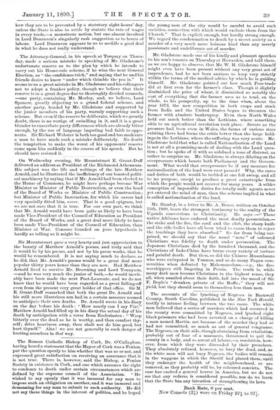Mr. Gladstone made one of his kindly and pleasant speeches
to his son's tenants on Thursday at Hawarden, and told them, as we are happy to observe, that Mr. W. H. Gladstone himself might even have been present without any very great act of imprudence, had he not been anxious to keep very strictly within the terms of the medical advice by which he is guiding himself. Mr. Gladstone pointed out how much Free-trade did at first even for the farmer's class. Though it slightly diminished the price of wheat, it diminished so notably the cost of everything that the farmer uses as to tend, on the whole, to his prosperity, up to the time when, about the year 1873, the new competition in both crops and stock from India and the United States began to threaten the farmer with absolute bankruptcy. Even then North Wales held out much better than the Lothians, where something akin to an agricultural revolution took place. Severe as the pressure had been even in Wales, the farms of various sizes existing there had borne the crisis better than the large hold- ings in the Lothians, where the suffering was very acute. Mr. Gladstone held that what is called Nationalisation of the Land is not at all a promising mode of dealing with the Land ques- tion ; but he spoke of it with so subdued a tone of distrust, as rather to surprise us. Mr. Gladstone is always dilating on the overpressure which besets both Parliament and the Govern- ment. What would that overpressure be if any measure for nationalisation of the land were ever passed P Why, the cares and duties of both would be trebled at one fell swoop, and all to no purpose, except to produce a great catastrophe from which the people would not recover for many years. A wilder conception of impossible duties for totally unfit agents never yet entered the mind of man, than the scheme implied in what is called nationalisation of the land.






































 Previous page
Previous page